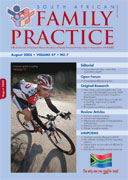Genetics in Family Practice: Rapid thrombophilia genetic test facilitates improved prenatal care for mother and child.
Abstract
Physiological changes in coagulation factors during pregnancy are important to minimise blood loss during gestation and delivery, but may also lead to a 4-6 fold increased risk of venous thromboembolism during pregnancy and after delivery. Approximately 25% of maternal mortality can be ascribed to thromboembolism if untreated, while this figure is reduced to less than 1% when diagnosed on time. Clinical diagnosis is complicated by the fact that the symptoms associated with venous thrombosis are relatively common complaints of pregnant women. A rapid genetic test has been developed for simultaneous detection of the most common genetic risk factors associated with thrombophilia, the factor V 1691GA (Leiden) and prothrombin 20210GA mutations. Mutation 677CT in the 5,10-methylenetetrahydrofolate reductase (MTHFR) gene, which increases homocysteine levels by 15-25% when two copies of the T-allele is present, is also included as part of this “prenatal care genetic test. Hyperhomocysteinaemia has been associated with an increased risk of thrombosis and neural tube defects. The importance of multi-gene testing is emphasised by the low predictive value of any single inherited marker and the significant increase in the probability of thrombosis when more than one risk factor is identified. (SA Fam Pract 2005;47(7): 50-51)
Published
2005-08-01
Section
Regulars
By submitting manuscripts to SAFP, authors of original articles are assigning copyright to the South African Academy of Family Physicians. Copyright of review articles are assigned to the Publisher, Medpharm Publications (Pty) Ltd, unless otherwise specified. Authors may use their own work after publication without written permission, provided they acknowledge the original source. Individuals and academic institutions may freely copy and distribute articles published in SAFP for educational and research purposes without obtaining permission.

